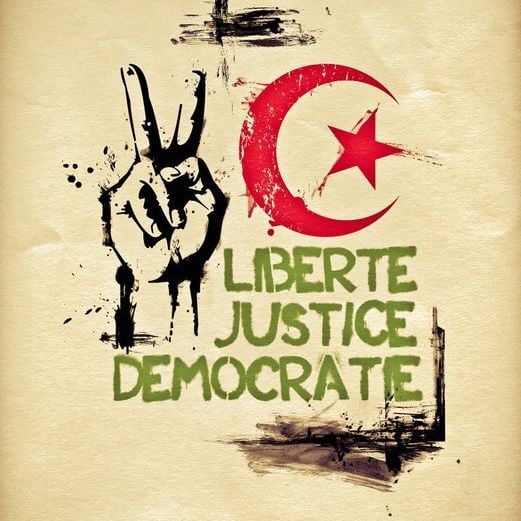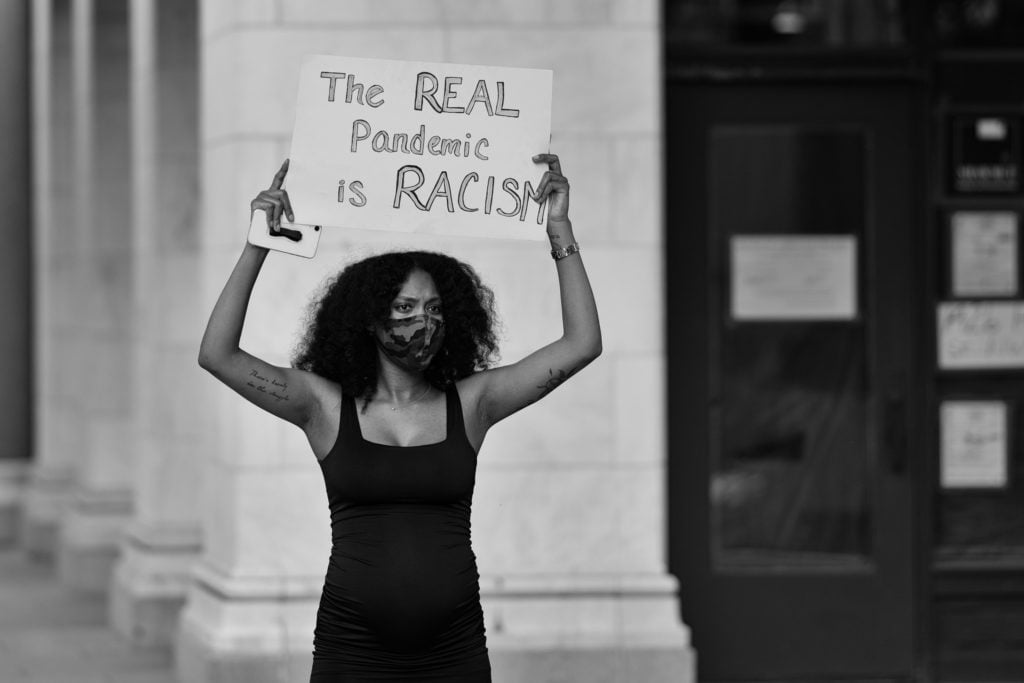Note: This interview was originally published in l’Humanité in French on June 2. We are republishing it here at Organizing Upgrade to bring it to English speaking organizers. It has been lightly edited for republication.
Libero Della Piana is one of the leaders of Alliance for a Just Society, a popular education organization that combats racism, advocates for social justice policies, and builds the capacity of local community organizations. Here, he analyzes the groundswell raised by the murder of George Floyd.
When so many African Americans are brutalized and murdered by the police, how do you explain the powerful wave of anger sparked by the death of George Floyd?
I think there is always a breaking point for oppression. We have reached the breaking point. Black people have learned to live with the outrage, with constant harassment, jail, and death. Often times the police killings are localized and isolated. They don’t make it to the national consciousness. The first time that reality changed was with the Rodney King beating in 1992. Black people knew the experience of police harassment and brutality, but to millions of Americans, it could be ignored or dismissed. Then suddenly it was on camera. Then as now, we assumed the evidence of police crimes on tape would lead to justice. When they didn’t in the case of Rodney King, Los Angeles erupted. Now, nearly 30 years later the killing of George Floyd has ignited the anger of the whole country in an unprecedented way.
I think what makes this killing different is 1) the particular brutality of an officer putting a knee on Floyd’s neck. The officer’s casual disdain and inhumanity. This was not a bullet fired in the heat of the moment but a nine-minute slow-motion lynching. 2) We have had a decade of increasing attention to the police killing of Black people and the slow spread of public support for Black Lives Matter (as a principal more so than an organization). All of this combined with decades of Black grief and frustration, decades of economic and wage stagnation and deep poverty in Black and indigenous communities, combined with the death of over 100,000 people in this country because of the negligence of our government, and the recent unemployment of over 40 million workers forced into unemployment in the past three months is a recipe for a social explosion.
In 1994, the riots triggered by the filmed brutality against Rodney King during his arrest were mainly located in Los Angeles. Why is the revolt from Minneapolis spreading across the country today?
Part of the resonance of the George Floyd killing is that so many Black people can identify with the circumstances. Being detained or arrested with impunity, excessive force used for suspicion of minor crimes (or no crime at all). Part of why this spread like wildfire is that there is hardly a city in this country, large or small, that does not have a police killing within memory.
Protestors in many of the over 100 cities which have had protests this week are often chanting the name of George Floyd along with local victims of police violence: Breonna Taylor. Sandra Bland. Kendra James. Sean Bell. Eric Garner. Michael Brown. Atatiana Jefferson. Alton Sterling. Freddie Gray. Laquan McDonald. O’Shae Terry. Too many to list.
I believe this uprising has spread because the killing of Floyd is so familiar to millions in every community. And the widespread access to digital communication has hastened the pace of the revolt. I grew up in a very white and conservative state, Utah. There were huge protests in Salt Lake City last week including the burning of a police car. If the uprising for Black lives has made it to Salt Lake City, this is a massive social movement.
Donald Trump multiplies provocations, fuels tensions, designates leftists and antifascists as terrorists. What is his strategy, a few months before the presidential election?
I believe Trump is resorting to the tried and true strategy of positioning himself as the “law and order” candidate and painting any alternative as the candidate of chaos. Last week, from the Rose Garden, Trump said “I am your President of law and order” and called for “security not anarchy.” He regularly calls protestors thugs. He is already appealing to the fear many white people have of communities of color, particularly embolden Blacks. He has repeatedly appealed to the police unions and organizations and received their endorsements. He famously joked to a gathering of police, “please don’t be too nice.” So while he claims to be “honoring” the memory of George Floyd, he continually deploys racist rhetoric and policies to promote greater police violence and impunity. He is actually toying with open authoritarian tactics like replacing local government authority with emergency military rule. And this strategy could very well work. He is behind in the polls and I think Trump and some supporters see this as an opportunity to play to their base.
It should also be said that many of the small but important reforms to policing begun under President Obama were undone by the Trump Administration. He ended consent decrees which forced Federal oversight of the worst police departments and ended enforcement of civil rights investigations of police killings just to name two negative changes. These are some of the things that would not solve the problem of police violence but would create greater levers for controlling the police on the road to the dismantling of the whole system of police, courts and prisons, which is completely rotten.
What is the political weight of white supremacists today? How involved are they in the police? Do they have relays in the judiciary?
There are the white supremacists on the streets of our cities and then those in the corporate suites and government halls. We have seen the small demonstrations of white nationalists and other extreme conservatives protesting against COVID-19 restrictions in recent weeks. We have seen their violence in places like Charlottesville, Virginia where they killed anti-fascist protestor Heather Heyer in 2017. There have been credible reports from Minnesota and elsewhere that they have been active at the sites of some of the protests. We know that they are small but significant and that they often have the ear of elected officials in many states. We also know that they are well-armed and that there is a history of their membership in law enforcement and the military. But I think they are also a small minority view. They use tactics to intimidate and confuse but are fairly isolated.
The danger is when President Trump and other powerful elected officials and media figures amplify their voices and justify their politics. There has long been far-right and white supremacist influence in Washington DC, but Trump put prominent white nationalists in his administration and among his visitors. This is unprecedented in modern times. This combination of official sympathy to openly fascist and racist violence elements is what makes the Nazis and the Klan and all their new forms so dangerous.
Obama exalted a post-racial America. During his presidency, the events in Ferguson highlighted the persistence of violence and police impunity. Can we seriously combat racism in a capitalist context which perpetuates social inequalities?
Racism and capitalism are intertwined. They are not really two systems but one. The very emergence of capitalism in the United States is dependent on the institution of slavery and the wholesale removal and genocide of the indigenous people of the continent and vice-versa. We can and have made huge — and even revolutionary — reforms to curb racism over the years. The country fought a civil war to end slavery, and had a far-reaching social uprisings to end Jim Crow and de facto discrimination. We can and will win big reforms to racist policing, for instance. But as long as we have a system where a small elite benefit from the exploitation and oppression of the rest of us, there will always be institutional racism. Even after the system we now know is replaced with something based on human needs and social equity, this country will have a long road to racial reconciliation and healing. The racist legacy of our past and present is a deep wound.
What may be the political developments of the ongoing protest movement?
It is too early to tell where this movement will go and how it will develop. These developments are unprecedented, and the impact of them will be massive and long-lasting. We also do not know what the police and military backlash will be. How brutal will it be? What structural shifts will they try to impose to thwart the movement? How will the far-right white supremacists react? I think one of the key measures of the movement will be how it adapts after street action dies down, after tempers cool. Can the movement build organizational power and discipline and build a political agenda to win big reforms? Can the movement build bridges in the labor and environmental movements, etc.? There is an overwhelming sense of solidarity right now and an outpouring of anger over George Floyd’s death from all sectors. But building a lasting and powerful coalition to dismantle the pillars of police violence will not come easily or quickly. Can the movement consolidate in time for the November election? These are all big questions that have yet to be answered. We have to help answer them together.
Did you enjoy this article?
We're in the middle of our annual fund drive, and this year we're building our own internal infrastructure for subscriptions, meaning more of every dollar pledged goes to fulfilling our mission. Subscribe today to support our work and be a part of Convergence's next evolution.

